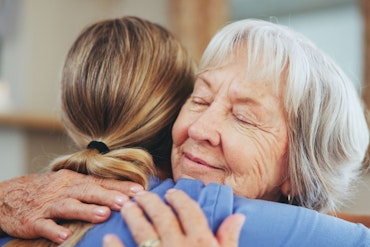See me, Hear me
A DVD documenting Western Australia’s Dementia Training Study Centre’s collaborative Aboriginal art project, with Hall & Prior’s Windsor Park Aged Care Home, was launched yesterday at Windsor Park’s Coolibah House in Carlisle.
A DVD documenting Western Australia’s Dementia Training Study Centre’s collaborative Aboriginal art project, with Hall & Prior’s Windsor Park Aged Care Home, was launched yesterday at Windsor Park’s Coolibah House in Carlisle.
Entitled Nungoo ngich Dunga ngich (See me, Hear me), the documentary represents a 15 month collaboration between Windsor Park’s Aboriginal residents and their families, renowned Noongah artist, Ron Gidgup, film makers Arun Raj and Sean O’Keefe, and staff from the WA Dementia Training Study Centre (WADTSC) and Windsor Park Aged Care Home.
“The success of the project means that WADTSC can see a way forward to making stronger connections with the Aboriginal community to work with them on areas of caring for older people,” Heather Freegard, project coordinator at WADTSC, says.
“For the WADTSC, the project will form the basis for developing training materials and processes for health professionals working with Aboriginal people with dementia in mainstream services,” Ms Freegard explains. “For the residents, it has demonstrated that how a person spends their time and the relationships they share are the most important aspects of living, and far outweigh the disease they have in determining their quality of life.”
Aboriginal residents and their families were invited to share stories and be involved in creating three murals: one that tells men’s stories located on the veranda of Coolibah House; one that tells community stories located in the garden; and one that tells women’s stories in a stitched wall hanging that hangs in the lounge room.
The artwork demonstrates the commitment of everyone involved in the project to building trust and relationships over time, and makes the home’s environment more attuned to the cultural needs of the Aboriginal residents with dementia who live at the home.
“The project started from a simple desire to bring art to the elderly Aboriginal residents to try and stimulate them into engaging in cultural activities that would awaken their spirits,” says the project’s artist, Ron Gidgup.
“The most emotional highlights for me were seeing the Elders laughing, yarning, singing, playing musical instruments and just opening up in the art project; hearing them tell me about their childhoods and family members; seeing them light up each time they saw me.”
Initially conceived as a way to develop a culturally sensitive approach to caring for the increasing number of Aboriginal people with dementia living in residential aged care homes, the project has provided Windsor Park’s staff with the opportunity to provide better care by understanding the residents through their life stories.
“We are excited to have had the opportunity to be part of this culturally appropriate lifestyle activity and listen to the stories of our residents’ lives,” says Windsor Park’s executive manager, Sharyn McDavitt.
“These stories have been introduced into the artwork, which the residents now have a connection to.”
The DVD will now be made available through the Dementia Training Study Centre as part of a professional development package to other people who care for aboriginal people with dementia in aged care homes, as well as facility managers and health professionals who have an interest in Aboriginal art and culture. The package should be completed later this year.
Hall & Prior is a private organisation that specialises in residential aged care in New South Wales and Western Australia.























